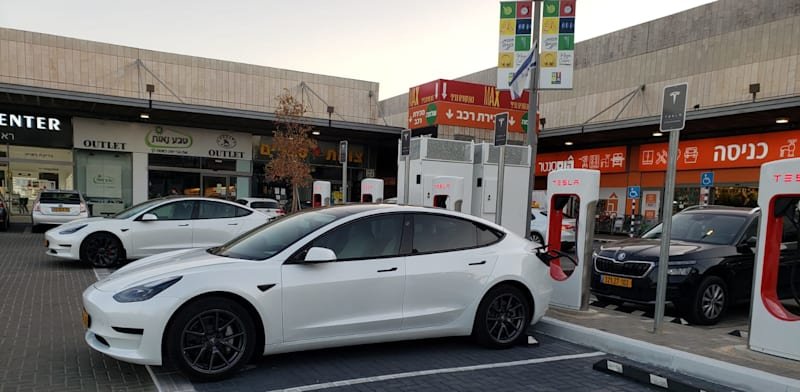Israel far from pledge to complete transition to EVs by 2030

In November 2018, Israel became one of the world's first countries to set a target for banning sales of gasoline and diesel cars - 2030. The ostensible commitment gained Israel prestige in international forums like the OECD environment and climate change global forum. It was only last week that California enacted legislation to ban sales of no- electric vehicles by 2035. But in Israel words are one thing and deeds another. Israel's ambitious declaration is still far from being applied.
One of the main problems with Israel's commitment to phase out all but electric vehicles by 2030 is the absence of legislation and no clearly defined intermediary milestones anchored in law. In the original 2018 plan, targets were set of 5% of sales of electric vehicles by 2022, 23% by 2025, and 61% by 2028. At present 6% of new car sales in Israel are electric vehicles and this figure could reach 8% by the end of the year due to 'panic buying' before purchase take is raised in January 2023.
But if Israel genuinely wants to reach a situation where 300,000-350,000 electric vehicles are going onto the roads annually by 2030, there must be long-term strategic investment by the government in expanding charging infrastructure.
In the UK, for example, the government approved a budget of £1.6 billion last March for expanding the charging infrastructure by 2030. The US has approved a budget of $7.5 billion for expanding charging infrastructure and setting up hundreds of thousands of government subsidized quick charging points along America's major highways.
In contrast in Israel, there are just 60 government funded quick charging points, according to research by consultancy company BDO, and about 1,200 are required by 2025 to achieve the target. Although in recent months we have seen a flood of government tenders for setting up both quick and slow charging stations, the entire budget allocated to the subject, since the declaration of the "zero emissions target by 2030" at the end of 2018 until today is just NIS 110 million. According to industry estimates, in order to adapt the charging infrastructure to 100% new car sales, the Israeli government needs to invest NIS 70-100 million every year.
To put this amount into perspective, the Israeli government has earned revenues of NIS 54 billion for excise on gasoline and diesel over the past three years and less than 2% of the amount from polluting fuel has been spent on the transition from gasoline to electricity. And if we added up the government's entire revenues from taxation on cars over the past three years, we would find that only 0.25% has been spent on the transition.
Electric vehicles are only becoming more expensive
In order to achieve a target of 100% sales of electric vehicles, Israel must also make the supply more accessible for the less economically well-off including special incentives for cheaper electric vehicles. According to the basic assumption of the plan, due to the transition to mass production of electric vehicles, the prices of vehicles and batteries will decrease, and will be comparable to those of gasoline and diesel vehicles. Therefore, the need for budgetary encouragement will decrease.
But a fall in electric vehicle prices in the global market has not happened. On the contrary, the demand for electric vehicles has soared due to the Covid pandemic and war in Ukraine, and the price of raw materials for the production of batteries has soared by hundreds of percent.
The bottom line is that without government tax incentives, the price of electric vehicles will be too expensive for the average Israeli consumer, and the 2030 target will be unachievable.
At present, estimates are that the 100% target won't be achieved until at least 2035, if at all. There are several ways in which the Israeli government could try to cope with the situation. There is the "Norwegian method" of cancelling all taxation on electric vehicles, foregoing revenues from gasoline and diesel and using the revenue surplus to speed up the shift to electric vehicles by 2030.
Or there is the "Israeli method" of sticking our heads in the sand and hoping that by the end of the decade the reality will have somehow changed or that everyone, including the international forums, would have forgotten Israel's commitment.
Ministry of Energy: We are promoting an incentive mechanism
The Ministry of National Infrastructures, Energy and Water Resources said, "As part of the vision, and as part of government decision 171 from 25.7.21, 2030 has been defined as the year by which 95% of new car sales in Israel will be electric vehicles. The Ministry of Energy is tracking the entry of new electric vehicles through detailed demand forecasts including a detailed plan for meeting the targets set. In order to meet these targets, the Ministry is promoting a mechanism for incentives for car importers to prefer importing less polluting vehicles. The mechanism is currently being examined by a joint team with the Ministry of Finance."
Related News
